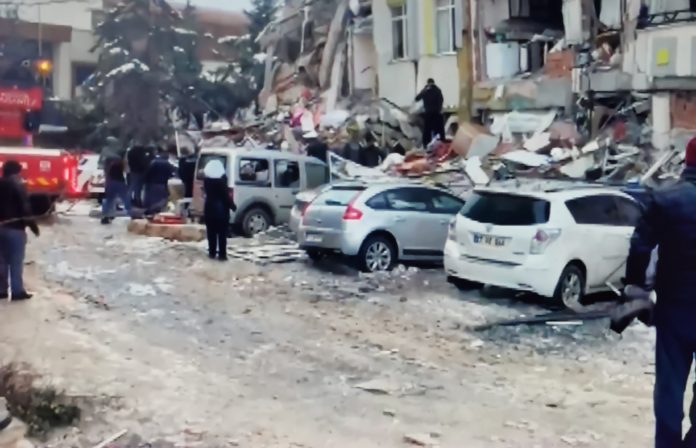Rescuers in Türkiye and Syria have been searching through the night to pull more survivors from the rubble after a 7.7 magnitude earthquake killed at least 5,034 people and caused widespread damage.
The death toll from earthquakes in southern Türkiye has risen to 3,432 with 21,103 injured, according to the latest official figures.
Vice President Fuat Oktay said over 8,000 people have been rescued from the rubble as 11,022 search and rescue teams are working in the field. He added that 338,000 earthquake victims have been housed in dormitories, universities and shelters.
In Syria, officials reported that at least 1,602 people were killed and over 2,400 others were wounded.
The situation in northern Syria is thought to be more desperate than Türkiye because the border remains tightly controlled and there is no international rescue effort and little heavy machinery.
The 1.7 million displaced people living on the border have been living in temporary shelters and half-finished buildings for years, as a result of the war.
Freezing conditions are hampering the rescue effort. In Gaziantep, where the first quake struck, it is around 4-6 C by day but will plummet overnight to -7C. It could be as low as -15C in the towns and villages towards the mountains.
Subscribe to our newsletter and stay updated on the latest news and updates from around the Muslim world!
It won’t be as cold in Syria, but no more than 10 or 11C by day and -3C by night.
Many people are having to huddle around makeshift fires on the street, too afraid to go home for fear of another deadly tremor.
Meanwhile, up to 23 million people could be affected by the massive earthquake, the World Health Organization warned, as it promised long-term assistance to victims.
“Event overview maps show that potentially 23 million people are exposed, including around five million vulnerable populations,” WHO senior emergencies officer Adelheid Marschang said.
“Civilian infrastructure and potentially health infrastructure have been damaged across the affected region, mainly in Türkiye and northwest Syria,” she said.
The WHO “considers that the main unmet needs may be in Syria in the immediate and mid-term,” Marschang told the WHO’s executive committee in Geneva.
“It is now a race against time,” said WHO chief Tedros Adhanom Ghebreyesus, explaining that the UN health agency was urgently sending aid to the area.
“We’re mobilising emergency supplies and we have activated the WHO network of emergency medical teams to provide essential health care for the injured and most vulnerable.”
Türkiye’s Disaster and Emergency Management Presidency (AFAD) announced that it has deployed about 13,740 search and rescue personnel to the region affected by the earthquake.
AFAD also said 360 vehicles and 3,361 construction equipment were also dispatched to help in the rescue operation.
Four mobile social service centres, 1,322 personnel and 100 vehicles were sent to the region for psychosocial support.
International aid is being sent to the affected region from the UN, EU, Nato and the governments of the US, UK, China, Russia, India, Japan, Iraq, Iran, Australia, New Zealand, Greece, Pakistan, among others.
DONATE TO ONE UMMAH’S EMERGENCY EARTHQUAKE APPEAL: https://donate.oneummah.org.uk/5pillars-earthquake-response























